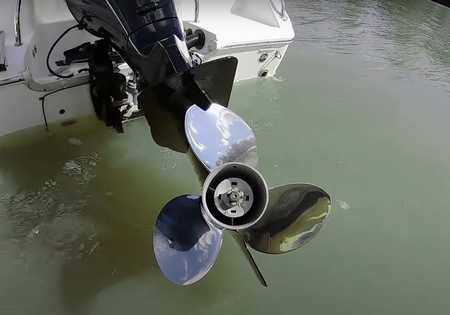Choosing propeller for outboard motor
- Home
- Blog
- Outboard motors
- Choosing propeller for outboard motor
Choosing the right propeller for your outboard motor can have a significant impact on the performance and efficiency of your boat. A propeller that is too small or too large, or that is not well-suited to your boat's intended use, can result in poor handling, reduced speed, and increased fuel consumption.

To choose the best propeller for your outboard motor, there are a few key factors to consider:
- Engine horsepower and propeller size: The size of the propeller should be appropriate for the horsepower of your engine. A larger propeller will be more efficient, but it will also put more strain on the engine, potentially causing damage if the engine is not powerful enough. On the other hand, a propeller that is too small will not be able to make full use of the engine's power, resulting in reduced performance.
- Boat type and intended use: Different propellers are designed for different types of boats and uses. For example, a propeller designed for a high-speed bass boat will be different from one designed for a pontoon boat. Consider the type of boat you have and how you plan to use it when selecting a propeller.
- Pitch: The pitch of a propeller refers to the distance it will travel in one revolution. A higher pitch propeller will move the boat faster, but will also require more power from the engine. A lower pitch propeller will be more efficient, but will not provide as much speed. The right pitch will depend on the horsepower of your engine, the type of boat you have, and your intended use.
- Material: Propellers can be made from a variety of materials, including aluminum, stainless steel, and composite materials. Aluminum propellers are generally the most affordable, but they can be prone to corrosion and may not be as durable as other options. Stainless steel propellers are more expensive, but they are resistant to corrosion and can be very durable. Composite propellers are also durable and lightweight, but they can be more expensive than other options.
- Brand and model: Different brands and models of propellers can have different performance characteristics, so it can be helpful to do some research and read reviews to find the best option for your needs. Pay attention to the pitch, diameter, and number of blades of the propeller, as well as any special features it may have, such as cupping or a ventilated design.
Two-blade propellers are generally more efficient at high speeds, while four-blade propellers provide better acceleration and handling at lower speeds. The direction of rotation should match the rotation of your outboard motor, and the diameter of the propeller will affect how much water it can displace and how much thrust it can generate. A propeller with a cupped or ventilated design can improve performance, particularly at lower speeds.
It's worth noting that choosing the right propeller is often a matter of trial and error, and you may need to try out a few different options to find the one that works best for your boat and engine. When testing out a new propeller, pay attention to factors such as speed, acceleration, handling, and fuel consumption to determine whether it is the right fit.
If you are unsure about which propeller to choose, you can consult with a dealer or mechanic who specializes in outboard motors. They will be able to provide guidance and recommendations based on your specific needs and preferences.
In conclusion, selecting the right propeller for your outboard motor is essential for optimizing the performance and efficiency of your boat. To choose the best propeller, consider the horsepower of your engine, the type and intended use of your boat, the pitch and material of the propeller, and the brand and model. Other factors to consider include the number of blades, rotation, diameter, and any special features such as cupping or venting. Keep in mind that the right propeller may vary depending on your specific needs and preferences, and you may need to try out a few different options to find the one that works best for you. If you are uncertain about which propeller to choose, seek the guidance of a specialist or mechanic to help you make an informed decision.



